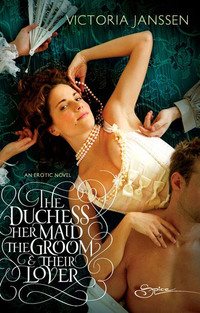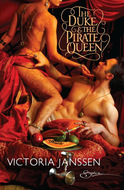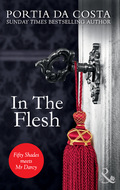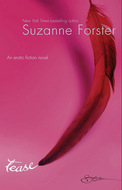Książki nie można pobrać jako pliku, ale można ją czytać w naszej aplikacji lub online na stronie.
Czytaj książkę: «The Duchess, Her Maid, the Groom & Their Lover»
VICTORIA JANSSEN
THE DUCHESS, HER MAID, THE GROOM & THEIR LOVER
MILLS & BOON
Before you start reading, why not sign up?
Thank you for downloading this Mills & Boon book. If you want to hear about exclusive discounts, special offers and competitions, sign up to our email newsletter today!
Or simply visit
Mills & Boon emails are completely free to receive and you can unsubscribe at any time via the link in any email we send you.
For Lorrie. Twenty-plus years of pie and helicopters, and counting.
 CHAPTER ONE
CHAPTER ONE
The Duchess Camille’s maid, Sylvie, draped a blue silk robe over her shoulders. Camille had to restrain herself from clutching it to her bare breasts. Normally, Camille had no particular emotion about being dressed or undressed by her servants—it was too common an occurrence—but today each touch made her flinch. Sylvie’s anger made her tension worse, even when demonstrated only as a hint of roughness when tugging Camille’s long, dark hair free of the robe. Sylvie hadn’t yet cleansed the splotch of Camille’s blood from the front of her own simple blue gown, and her long blond braid extruded messy wisps. It didn’t help to know Sylvie was not angry at her, but the Duke Michel.
Across the room, the midwife finished washing in a porcelain basin painted all over with flowers no larger than a woman’s thumb, the fierce jerks of her arms dripping water and imported jasmine-scented lather onto carpet so thick it swallowed the feet. The midwife’s cropped hair glistened in the light of a dozen fat candles. They were surrounded by all the luxury one could want, except for safety.
Camille didn’t dare give in to her own anger. She had denied it for so long that it had gone solid in her belly like a chunk of dirty glass. She felt sick with it, and weary down to her marrow. She would give anything to be alone for a few moments, to collect herself, but if she sent them away now, after the examination she’d just endured, she would reveal her weakness. She had already let slip her emotions once today, when the duke had told her Lord Alphonse was dead. In her distress, she had nearly revealed his mission, the mission which had led to his death. She would keep her dignity now, and with it her secrets.
Sylvie said, “I will fetch you a glass of wine, madame, and ice for your bruises.”
“Sit,” Camille ordered, unable to bear a continuation of Sylvie’s earlier pacing of holes in the plush gold carpet. She glanced toward the washbasin, carefully avoiding her reflection in the nearby full-length oval mirror, its wide frame like a tangle of golden brambles. “Mistress Annette?”
The midwife was thirty years old at the most, and normally worked at the brothel in the town, caring for the diseases from which prostitutes suffered and helping to birth what children they might bear. She was a tiny woman with hair cut close to her scalp and a scar on her chin. For her surreptitious visits to the palace, she dressed in a baggy dun gown, a sparrow flitting into a golden cage and out of it again, unnoticed by any except Sylvie and Camille. Camille had never seen her elsewhere. She did not even know where Mistress Annette lived; Sylvie always fetched her, when she was needed. But she would—had—entrusted Annette with her health and life.
“You were not pregnant, Your Grace.”
Camille did not allow herself to show any reaction, but all the same, Sylvie rose from her chair and returned to where Camille stood.
“Am I injured?”
Mistress Annette picked up a towel and dried her hands. “You are bruised,” she said, as if Camille had forgotten the reddened swelling over her jaw and cheekbone, her skin broken from the impact of the duke’s rings. Her left shoulder ached from slamming into the silken wallpaper of his private audience room; her hip and elbow throbbed from hitting the marble floor.
“There is no injury inside?”
“No, Your Grace.” Mistress Annette set down the towel and stepped closer, until she stood within arms’ reach. She said calmly, “He will kill you one day, you know.”
Sylvie began to speak but Camille held up a hand for silence. “I could become pregnant. I am not too old.”
Mistress Annette crossed her arms across her chest. “Your Grace, I am hard put to remember you are not just any woman. Because in this matter, you are certainly as unwise as any I’ve met.”
Camille heard Sylvie catch her breath; ironic, as Sylvie was not afraid to speak her mind to her duchess, either. “If I give the duke an heir, he will have no need to find another duchess.”
“His Grace has no bastards, but not for lack of trying. Not a one. If I were you, I would find another sire, and pass the child off as his.”
Mistress Annette had never stated it so boldly before. Camille shook her head in refusal. She had married Michel, a younger son, and in becoming her consort, he’d become duke, with power over her. She could have protested her father’s order to marry Michel and run away, but she had not, foolishly fearing the duchy would suffer without her. She had spoken the vows with her own voice. Once she had done so, she had a responsibility to her marriage, and a responsibility to her duchy’s people. She had stood up to her mistake for over twenty years.
A few blows should not weaken her resolve so much. Except, this time Lord Alphonse had died. He’d been killed while trying to help her, not even knowing that the appeal he carried to Lord Maxime betrayed his duke. He’d been barely older than Annette or Sylvie. Sylvie might very well be next.
“Madame!”
Camille blinked as the room slowed and settled. Sylvie was holding her arm, fingers digging painfully into her bruised muscles. Mistress Annette ducked beneath Camille’s other arm and supported her to her bed. The underside of the bed’s canopy, blue and gold like the sheets and coverlet, bore appliquéd figures of men plowing fields and sowing grain, a transparent allegory to encourage the fertility of the couples who lay within. Except Michel had never taken her here; she’d always been brought to his chambers, or more lately, wherever he felt she would be uncomfortable and refuse his advances.
“He will kill you,” Annette said again, without emphasis, as if stating the sky was blue. She laid the back of her hand against Camille’s forehead, then her cheek. Camille closed her eyes; that single tender touch brought her close to shattering. “Sylvie, fetch blankets.”
Nauseated and beginning to shiver, Camille said, “I’m only hungry. I didn’t eat while Sylvie went to find you.”
Annette tucked a pillow beneath Camille’s feet. She repeated, “He will kill you. And you know what will happen then. He will rape this duchy, and then move on to the next, just as your father did.”
Even now, Camille could not bring herself to say aloud that she had failed, that Michel had indeed won, even when it was true. She said, “You must leave the palace, before you’re found in my apartments.”
“Never fear, Your Grace. Unlike you, I have concern for my own skin.”
Sylvie returned and spread blankets over Camille’s feet before moving upward. “Madame, you need rest. Annette, what must I do?”
“Convince her to find someone else to get her with child,” Annette said. “And have a care that he’s healthy, and looks enough like the duke.”
Camille was no longer allowed to ride, but she could still venture out onto the palace’s high white walls and glimpse her horses from afar. Two weeks after Mistress Annette’s visit, she strolled there, her two eunuch guards trailing behind. Kaspar and Arno knew when she was not in the mood for conversation; this cool spring evening, they did not even speak quietly with each other.
The breeze from outside was sharper up on the walls, and she smelled a hint of rain mingled with the grass and manure of the paddocks below. She slipped into an embrasure, concealing herself from anyone’s view—anyone except her eunuchs, of course—and gazed toward the stable that held her mare, Guirlande, and all the others she’d spent so long cosseting, training and schooling.
The stableboy was riding Lilas, his body seemingly immobile atop her sleek back as she danced patterns into the loose dirt of the riding ring. Only his thick brown hair ruffled in the wind. Four years ago, the duke had forbidden her to ride, and since that day she had not been to the stables, nor near her horses, nor had she spoken to their keeper. But she had years ago watched the boy be trained to ride. She had ridden out with him, and she knew his posture and seat, even from this distance. Her Lilas was in good hands.
She wondered what he looked like now that he was closer to his man’s growth. She remembered big hands, lush eyelashes and an engaging, open smile. He would be almost twenty now, and might have changed a great deal. It occurred to her that he was half her age. If she had borne a child in the first years of her marriage to Michel, the stableboy was the right age to be her son.
Sylvie had reminded her that the stableboy’s eyes were blue. Like the duke’s.
Normally, she would watch until she had caught at least a glimpse of each of her horses, and perhaps drawn in her sketchbook, but this evening she turned away and strode toward her own wing of the palace. The wall’s stone felt cold beneath her thin slippers. Kaspar and Arno fell in behind her, their movements betrayed by the faintest chiming of their weapons; they followed her down the turret staircase, across a square of immaculate garden that replaced the old bare defensive area, and through enormous mahogany doors carved with the ducal arms, each door swung wide by a footman in the duke’s livery.
Camille led her eunuchs past the locked door of her audience room and through a hidden doorway. The narrow secondary corridor leading to her suite of rooms was thickly carpeted in blue and gold, an agreeable softness to her cold feet. Camille did not allow herself to slow and appreciate the softly patterned gold wallpaper, the candles muted behind colored glass or the paintings of horses that adorned the walls. Sylvie would have dismissed the rest of the staff by now, and they would have less than an hour of privacy.
Kaspar and Arno followed her through the outer rooms and into her bedchamber where Sylvie waited, perched on the edge of a spindly, decorative chair that Camille had never liked. “All is as you wished, madame,” Sylvie said, meaning that the suite was deserted but for the four of them.
For this meeting, they all should sit, Camille thought, for she asked more of her servants than duty. She looked to Kaspar and indicated the empty chairs. Kaspar grinned. “Perhaps not, Your Grace. I fear it would shatter beneath my weight.” He was taller than most and twice as broad. Leather straps crisscrossed his bare, hairless torso, supporting a knife sheath that nestled between his shoulder blades. The knife’s flat grip, she knew, had been etched and inlaid with silver filigree in her own crest. A short sword was strapped to each thigh atop his blue breeches, but those hilts were unadorned, wrapped in strips of dark blue suede.
Arno, the younger of the two eunuchs, said, “I would prefer to sit on the floor, Your Grace.”
“Very well,” Camille said. She took a chair. Even seated on the floor, the eunuchs were not so far below her and Sylvie. Once all were settled comfortably, she captured them with her eyes, giving each a smile. It was not only for herself and her own safety that she did this, but for theirs; it was only right that she pay them this respect. Then she said, “Of the men whom Sylvie has investigated, three were superior choices in terms of health, appearance and proximity to the palace.”
“Madame,” Sylvie said, “we could entice Lord Pierken from his estate. He has an interest in you.” Kaspar sent her a quelling glance, and she made a rude gesture at him.
“I fear not,” Camille said. “Remember, it’s planting season.” Also, Lord Pierken would not be content to simply impregnate her and depart. He would want something in return, more than she could give. She continued, “Of the three, Lord Gustave resembles Michel the most, physically. His temperament is not suitable, however. He is quick to take offense and convinced of his own importance. I dare not trust him to keep this secret. And he might require a longer-term liaison and a gift of political power in exchange for his seed, which I will not give.”
Sylvie asked, “And Lord Jon-Petite?”
“I fear he is too old,” Camille said reluctantly. “He has a son nearly thirty years old, and he has no other. He is my ally in the palace, it’s true, and it would be easier to arrange meetings with him, but if he cannot serve the purpose the effort will be wasted.” She had once considered him a friend, and though she rarely saw him anymore, she hated the thought of destroying their friendly relationship with her demand that he put himself in deadly danger to service her like a stallion. Also, she was not sure that Lord Jon-Petite’s scruples would allow him to betray her husband.
Sylvie said, “That leaves only the stableboy!”
Camille glanced to Kaspar, then Arno. Their expressions remained impassive. She said calmly, “You yourself brought him to my attention as a potential candidate. He is young and healthy, he has the necessary hair and eye color and his mother came from Michel’s homeland, so there is a superficial likeness of facial and body type. Best of all, he is loyal to me, yet will not feel entitled to interfere with my role as duchess. He is good with my horses. He is the best choice for this.”
“But—madame—he is a boy! Nineteen years old!”
“All the more likely he’s virile, then,” Camille said. “You will bring him to me as soon as possible. His name is Henri.” She swallowed the lump forming in her throat. Who was she to demand such a thing of him, when he’d given her nothing but loyalty? But if she did not do this, Michel would kill her, and she did not want to die.
“He will not understand the serious nature of this duty—”
“Sylvie, you will bring him to me.”
If Sylvie truly thought the boy would not serve the purpose, she would never have included him in her list. She stiffly bowed her head. It didn’t matter that she wasn’t pleased. She would obey. Later, she would see that Camille had made the wisest possible choice. She need not fear having to exchange political favors with a stableboy. And if he cared for her as he did for her horses, she did not think he could betray her.
“Kaspar and Arno,” Camille said, “this plan may fail. If it appears my imprisonment or execution is imminent, we must flee the palace. I rely on you both, and on you, Sylvie, to secure sufficient monies and supplies for a journey of some weeks. You three will accompany me. It is crucial that this activity be completely concealed from any in the palace or in the town.”
“It shall be done,” Kaspar said. “Where will we go?”
“We shall travel to the coastal protectorate, and there beg aid of Lord Maxime. He will keep us safe. He will not have forgotten that he and I grew up together, here in the palace.”
“Lord Maxime?” Arno blurted out. “Your Grace, he would like nothing better than to make the protectorate a duchy again! What better way than to harm you?”
Camille eyed him coldly. “Harming me would change nothing. It is my husband who will not free the protectorate,” she said. “He claims it is because my father conquered it and killed Maxime’s father, and it is his duty to care for the land and its people. But the duke wants only the protectorate’s income. Maxime will help me. Then we shall return here, and I will take what is mine.”
True, Maxime would want favors from her. He would not help her out of pure charity; for the sake of his people, he could not. For the sake of her own people, she would only give so much. But he would help her, and then…then she would make sure that Michel never harmed anyone again.
 CHAPTER TWO
CHAPTER TWO
Henri ran his hands over Guirlande’s sleek hide, adding a final gloss to her grooming. As he ducked beneath the cross-ties which held her still, she snorted affectionately into his hair. Henri grinned and loosed the ties from her halter before moving on to Tonnelle.
“Boy!”
Henri whirled, wondering what he’d done—or not done— this time. A sharp-featured young blond woman stood in the open doorway of the stable, holding her skirts well clear of the straw. He’d spotted her once or twice before and assumed she was the lover of one of the senior grooms or perhaps of a courier. She wore a nondescript scullion’s dress, but gestured as imperiously as an upper servant. “Leave the horse. Come with me.”
“I have work,” he said.
“It can wait. Her Grace wishes to see you.”
At first, he was sure he’d misheard. He stood gaping. He hadn’t seen the duchess in months, even from a distance. He’d even heard whispered rumors the duke had killed her in a wild rage, or that she’d been shut up in an asylum, gone mad from failing to bear a child. Perhaps she had gone mad. It was unheard-of for her to summon a servant as lowly as he. Had he misunderstood? Was he meant to meet with a steward? Still, it would be good to know at least if she lived, and how she fared. Perhaps this woman could give him news; perhaps he could give her a message about the welfare of the horses. Perhaps that was why the duchess wanted to see him; she wanted to personally question him about her horses. “What does she want of me?”
“That is for Her Grace to say. Come, boy. I cannot loiter here all day.”
Henri kept his head down as he followed the maid through a servants’ entrance in the palace’s immense white walls, down a dim corridor, and through a fitted door into the ducal palace. Why had he been summoned? He could not guess if the purpose was good or bad. Or, he told himself, it might be good for the duchess, but bad for him.
The maid walked very quickly, without glancing behind to see if he followed. The floor was polished marble, a gray color that reminded him of winter ice. No one moved through the corridors, a circumstance Henri found chilling, as well; he knew the duke had nearly a hundred servants. Surely some of them would be about. Someone would have to clean this floor. And he knew a few footmen; they spent a great deal of time standing about in corridors, waiting for someone to need them. Where had the footmen gone? The only section of the palace that had no footmen was…but of course he could not be walking through the duchess’s wing of the palace. She saw her servants in an audience room, off the main hall, the one everyone knew from when court was open to the public. This must be merely a different route there.
That still didn’t explain the deserted corridors. The main hall would have even more servants than the duchess’s wing. As the maid led him up a narrow stairway that smelled strongly of lemon and beeswax, he wondered how many bribes their privacy had cost, and why the bribes had been necessary. Then the maid stopped before a mahogany-paneled door inlaid in gold leaf, opened it and gestured for him to go through. Henri did so; she did not follow. The maid shut the door behind him and he heard a thump, as if she had leaned her back against it.
The room was incredibly bright from a chandelier bristling with lit candles and crystalline droplets of the clearest glass he’d ever seen. The light reflected almost painfully from the white marble floor. The walls were hung with tapestries in lush twining, leaflike patterns of blue and gold, dazzling his eyes and muffling sounds. He felt as if he’d stepped inside a jeweled box, like the one in which the duchess had kept the bridle ornaments for Guirlande. Though for all its intricate glamour, the room felt too still; its air had the faintest dusty smell of disuse.
He turned to his right, intending to examine the tapestry more closely, and saw the duchess, immobile as a statue. Truly the duchess, and not some functionary. His breath caught at her beauty and aristocratic bearing. She wore a crimson gown with a belled skirt and a low squared neckline that emphasized her bosom, and more jewels than he’d ever seen in one place at one time, even on a courtier riding to a party. Faceted blood- colored rubies were pinned into her long silver-streaked hair; more rubies dripped from her ears like tiny clusters of grapes. Her pale eyes fixed on him, and he fell immobile from the intensity of her regard. Henri was rarely noticed by anyone. Being noticed by the duchess was like being hit in the chest.
She’d noticed him before. When he was a boy, it had been she who sent her own riding teacher to tutor him as well, for those times when she could not be present to school her own horses. And one time only, Henri had provided cupped hands to boost her foot into the stirrup. He’d been about fifteen then. He still remembered the gold heel on her supple leather riding boot, beneath a lavishly embroidered skirt hem; he’d been afraid to look higher. She’d given him a copper. Only weeks after, she’d been forbidden to ride—it was said her riding astride had prevented her from conceiving an heir. She had never even borne a girl.
She was forty now, and probably past bearing, so it couldn’t hurt for her to ride again, could it? She might defy her husband for such a freedom. Henri remembered how she’d stroked her horses’ necks and pressed her forehead to theirs. He’d watched her, many times. She loved her horses, he could tell, and for that reason he loved her. Horses knew people. One horse might love her if she were cruel, but certainly not all of them. Henri had ridden all of her horses, and every one worked with him in perfect trust. He’d ridden one or two of the duke’s hunters, as well; that had taught him that the duke was cack-handed and deaf to the animals’ body language, for their actions were stiff and awkward. In contrast, the duchess’s horses moved like silk.
“You look enough like my husband,” she said. “It should be possible.”
He couldn’t mistake her meaning. The whispers, the rumors, they were true. Henri couldn’t speak; one wrong word and she could have him caged in the city square and pelted with rotten fruit and rocks. But he couldn’t run away, either, because the duchess had summoned him. She’d had him summoned and he hadn’t fled, as any reasonable person would have done when the nobility took notice of them. If only he did not care. If only it did not matter to him if she bore an heir or if she died.
In this audience room, they were alone. If he were seen alone with the duchess, by anyone at all besides her loyal maid, he would die in the worst way imaginable. So far as he knew, the duchess was allowed no men in her direct presence without her eunuch guards—or without her husband, the duke, of course. Henri stared even harder at a porphyry medallion set into the white marble floor. The cleanliness and luxury made Henri’s knees shake and his balls shrivel. He was probably already doomed, when he had done nothing to harm anyone, nothing but obey the duchess’s maid who’d brought him here like a favorite riding hack.
“Boy? Do you understand what your duchess requires of you? I understand you know something of the breeding of horses, so you should be more than equal to this task.” Her voice was low but commanding. He could not imagine defying that voice.
She approached him, and he shrank from her. Was he supposed to reply? His throat felt stuffed with old hay. Then came the unthinkable—a light touch to his hair.
“Look up.”
Trembling, he did so, as if she tugged his reins.
“Please,” she said. She might as well have been asking for morning ale. Her face was like a silver coin he’d once seen, cleanly cut lips and a long, straight nose, but this close he could see the bruises, carefully covered, along her jaw, and fine lines feathering from the corners of her eyes. Thick swatches of iron-gray streaked the ebony hair that fell past her waist. Her eyes, the cold gray of a winter sky, shone and swelled with water before she blinked, once, and transformed them back to metal.
His world shifted for a moment into some afternoon fantasy, glimpsed in sunlit dust sifting down from the hayloft. He would save her, and she would…have him killed, so no one would know what she had done? “Y-Your Grace,” Henri said. Her gown exhaled costly spices he could not name. His own clothing was pungent from horses and leather and sweat. The maid had directed him to leave his muddy boots behind, so his bare, calloused toes curled against polished stone.
The duchess stood back from him, her skirts unfurling over her jeweled slippers. “If I do not provide an heir within the year, I will be killed, so my husband can take another wife within the bounds of law,” she said flatly. “They will shave my hair and cut off my head. Do you understand? Answer me.”
“Y-yes.”
“I cannot protect you. I am a woman and my command to my husband’s guards is not worth a copper coin.” She paused. “Will you do this for me?”
For her. She would never humiliate herself like this, not to someone like him, unless she truly needed his aid. His mouth felt numb with fear as he nodded and knelt on the marble, searching in vain for another flicker of humanity in her pale, regal face.
Her crimson gown rustled as she paced to the door, like the caged crow in the stables. He scrambled back to his feet and followed. She had what she wanted of him, as the aristocrats always had what they wanted. It was their right.
How in the world could he even disrobe before her? Much less…less…
She stopped before the door and said, as if discussing her choice of gown, “It’s best done now. My husband will send for me tonight.”
Henri nodded again. What else was he to do?
The duchess opened the door a crack and peered out. She murmured to her waiting maid, then snapped the door closed. Henri twitched. “This way,” she said.
He followed. A delicate wooden chair with a plush red seat and curving arms that ended in carved blossoms hid another door behind swaths of red fabric, embroidered all over with flowers in a deeper red thread. Henri expected darkness, but the corridor of red marble was lit by yellow beeswax candles, sweet-smelling and thick as his forearm, in gold sconces shaped as unearthly smooth disembodied feminine hands, braceleted in cruel red stones. He’d never seen so many candles in his life. Who lit them? Who trimmed away the drips? Ebony chairs lined the walls, each carved with more flowers and accompanied by its own little matching marble-topped table, for what purpose he could not imagine. Each table was bare. The duchess swept down the corridor without glancing at the paintings of flowers in gilt frames, the tapestries populated by gardens and ladies and fat babies, even the carved figure of the duke’s head in white marble whose gaze, blind but all-seeing, made Henri want to hide his eyes. To his relief, he saw no guards.
He had to catch himself when she abruptly halted and withdrew a golden key from her bosom. Hastily, Henri averted his eyes, saw the dirty smear his hand had left on the pale pink wallpaper, and scrubbed it clean with a corner of his sleeve. The key scratched in the lock and the door swung open.
Henri scarcely saw the rooms they passed through now. He retained a blurred impression of fresh flowers and jewel- colored velvet, oval mirrors in frames as wide as his hand, overstuffed tapestried sofas with matching pillows, silver platters of fresh, shiny fruit, sinuous glass oil lamps perfuming the air. When the duchess finally halted, a square wood bed loomed before him, roofed in wood, canopied and curtained in fringed gold silk and piled with tasseled blue pillows—a bed wider than a prize stallion’s loose box and half the size of the hovel where he had been born. Henri had spent his nineteen years sleeping on straw, his spare shirt for a pillow and rats scampering across his discarded boots. Now he was expected to service the duchess on a bed worth an entire village? Impossible. His cock dangled flaccid as an empty sausage casing. He didn’t recognize his own voice when he said, “Stop.”
The duchess turned.
“I—I want—” Henri swallowed.
The duchess gazed impassively at him. She said nothing. She did not have to speak, he realized. He was here; she’d got her way and apparently had no further concern for how the…act proceeded.
He would make her feel something. If he was to die after, then he wanted to die a man, not a silent slave. “I want you in there,” he said as firmly as he could, gesturing toward the room before, a less frightening room.
To his surprise, the duchess retreated without comment, her skirts brushing his leg as she passed. Henri shuddered like a nervous horse and went after her.
This room was huge as well, but at least there was no bed. The duchess said, “If you give me a child, I shall reward you in gold coin.”
Henri’s cheeks flushed with shame. He was not a whore. As if gold would help him, if the palace guards caught him in her chambers. Gelding by hot iron was the first and least of what he would suffer. Delicious anger stiffened his cock, rasping it against his homespun pants, and he found he didn’t care what she thought of him. He hadn’t been asked to be her friend, only her stud. He could do as he liked with her. Anything. In this room, Her Grace the duchess was his to rule.
If he failed, would she find another to do her bidding? He couldn’t bear the thought. He must not fail. For a little while, he must rule her.
“Remove your clothing,” said Henri.
Darmowy fragment się skończył.









